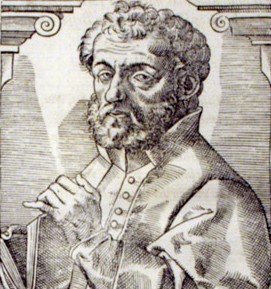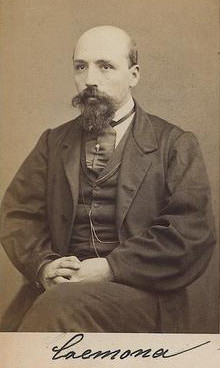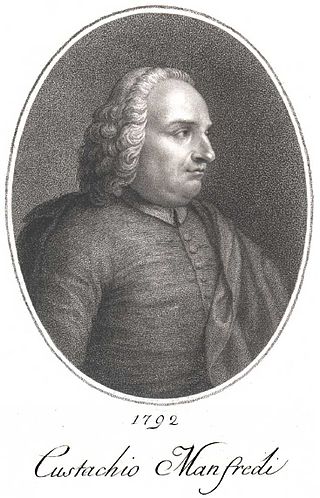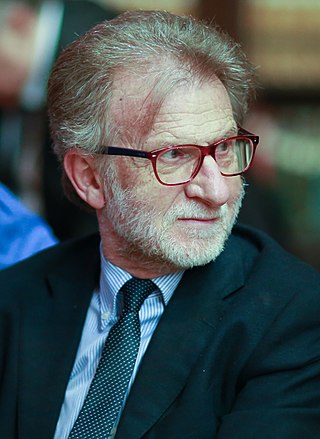
George of Trebizond was a Byzantine Greek philosopher, scholar, and humanist.

Antonio Luigi Gaudenzio Giuseppe Cremona was an Italian mathematician. His life was devoted to the study of geometry and reforming advanced mathematical teaching in Italy. He worked on algebraic curves and algebraic surfaces, particularly through his paper Introduzione ad una teoria geometrica delle curve piane, and was a founder of the Italian school of algebraic geometry.
The primary languages of Calabria are the Italian language as well as regional varieties of the Neapolitan and Extreme Southern Italian, all collectively known as Calabrian. In addition, there are 100,000 speakers of the Arbëresh variety of Albanian, as well as small numbers of Calabrian Greek speakers and pockets of Occitan.
Owing to its origin in ancient Greece and Rome, English rhetorical theory frequently employs Greek and Latin words as terms of art. This page explains commonly used rhetorical terms in alphabetical order. The brief definitions here are intended to serve as a quick reference rather than an in-depth discussion. For more information, click the terms.
Language of Nazi concentration camps refers to a common stratum created in various languages of inmates of Nazi concentration camps that described the notions unique to life in the camps and served as lingua franca.
Raphael Regius was a Venetian humanist, who was active first in Padua, where he made a reputation as one of the outstanding Classical scholars, then in Venice, where he moved in the periphery of an elite group composed of a handful of publicly sanctioned scholars, salaried lecturers employed by the Serenissima itself: on the fringes of this elite world also moved the scholar-printer Aldus Manutius.

Adolfo Targioni Tozzetti was an Italian entomologist who specialised in Sternorrhyncha. He was Professor of Botany and Zoology in Florence, associated with Museo di Storia Naturale di Firenze where his collection remains today at La Specola. He was especially interested in pest species, mainly mealybugs, scale insects and other pests that attack citrus and peaches. He described many new taxa.
David Castelli was an Italian scholar and educator in the field of secular Jewish studies. He was educated at the rabbinical college of Leghorn, and from 1857 to 1863 was teacher of Hebrew and Italian in the Jewish schools of that city. Then he became secretary of the Jewish congregation in Pisa, where at the same time he was a private teacher. From January 1876 until his death he occupied the chair of Hebrew at the Istituto di Studi Superiori Pratici e di Perfezionamento in Florence.

Michele Ferrero is a Catholic priest, born in Cuneo, Italy, Salesian of Don Bosco, Professor of Moral Theology and Classics, graduated from Taipei Fu Jen Catholic University. Faculty of Theology. He is author of books and articles about Taiwan, China and moral theology. He holds a doctoral degree in theology and a degree in Classics from the State University of Torino (Italy). He has served in Taiwan, Hong Kong, Shanghai, Turin, Italy and Jerusalem. He is the author of "The cultivation of virtue in Matteo Ricci's 'The true meaning of the Lord of Heaven'"(Fu Jen Catholic University Press, Taipei, 2004), an important study on moral issues common to the Christian and the Confucian traditions. He is currently teaching Latin and Western Classics at Beijing Foreign Studies University. He works as Foreign Expert in Latin at the National Research Centre of Overseas Sinology of Beijing Foreign Studies University.
Franco Manzi is an Italian Catholic priest and academic.
Donatella della Porta is an Italian sociologist and political scientist, who is Professor of political science and political sociology at the Scuola Normale Superiore. She is known for her research in the areas of social movements, corruption, political violence, police and policies of public order. In 2022, she was named a fellow of the American Academy of Arts and Sciences.
Alberto Melloni is an Italian church historian and a Unesco Chairholder of the Chair on Religious Pluralism & Peace, primarily known for his work on the Councils and the Second Vatican Council. Since 2020, he is one of the European Commission's Chief Scientific Advisors.
Giuseppe Bertoloni was an Italian botanist and entomologist.
Carla Bazzanella was an Italian linguist.

Michele Sorice is an Italian sociologist and political scientist known for his work in the fields of political communication, political science and critical media studies. He is the author of over 25 books and 50 articles.

Eustachio Manfredi was an Italian mathematician, astronomer and poet.
Filippo Carli was an Italian sociologist and fascist economist.
Gianfranco Cimmino was an Italian mathematician, working mathematical analysis, numerical analysis, and theory of elliptic partial differential equations: he is known for being the first mathematician generalizing in a weak sense the notion of boundary value in a boundary value problem, and for doing an influential work in numerical analysis.

Ivano Dionigi is an Italian lecturer and rector.

Girolamo Saladini was an Italian mathematician. He was one of the brightest pupils of the Italian mathematician Vincenzo Riccati, with whom he had a fruitful collaboration: together they wrote the Institutiones Analyticae, in three volumes published in Bologna in 1765–1767 with th publisher Stamperia di San Tommaso d'Aquino. Saladini edited the Italian translation, published in 1775 with the same publisher.








